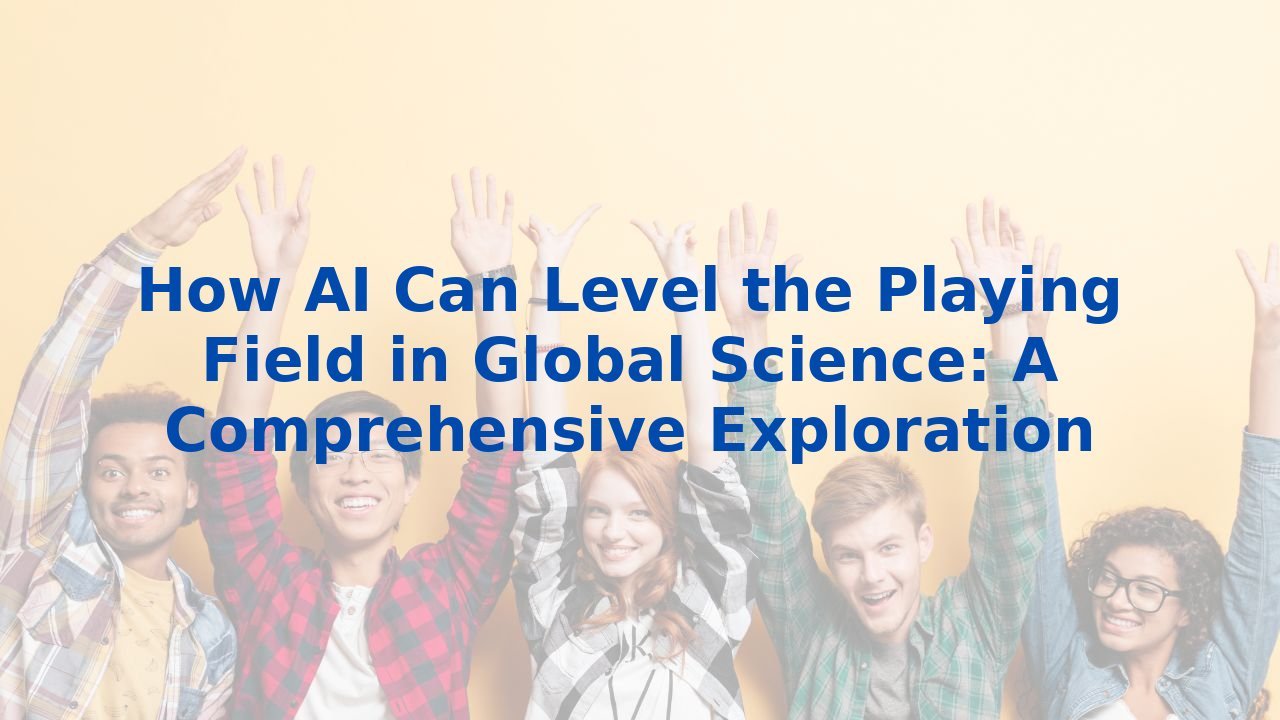How AI Can Level the Playing Field in Global Science: A Comprehensive Exploration
The Fairness in Science: Enhancing Efficiency with AI
Introduction
The global scientific community is at a crossroads, grappling with long-standing challenges of fairness and equity in research. For years, the allocation of resources and access to opportunities has been skewed, favoring high-income countries and limiting the potential for groundbreaking discoveries in low- and middle-income nations. However, as we stand on the brink of an AI revolution, we now have a unique opportunity to address these disparities and redefine the landscape of scientific research.
The Challenges of Fairness in Science
The scientific enterprise has often been marked by an uneven playing field, creating barriers that prevent equitable participation. Some of the critical challenges include:
- Resource Distribution: Research funding tends to flow towards prestigious institutions in high-income nations, leaving researchers from less affluent backgrounds struggling for support.
- Access to Information: The high costs associated with accessing subscription-based scientific publications can deter researchers in resource-limited environments from staying informed.
- Collaboration Challenges: Corruption and disparities in institutional capabilities create significant hurdles to establishing fair partnerships across varying economic landscapes.
The Role of AI in Enhancing Fairness
Now, how can AI help level this playing field? Here’s where we uncover the transformative potential of artificial intelligence:
- Open Access Publication: AI can foster systems that enable the open access publication of research findings. Automated platforms can help manage and disseminate research papers, breaking down financial barriers that limit access to knowledge.
- Fairness in AI Systems: By designing AI tools to ensure fair algorithmic performance across languages and demographics, we can encourage inclusivity and broaden the scope of research.
- Crowdsourced Audits: AI can facilitate unbiased audits of its own algorithms, encouraging a transparent approach to identifying and addressing discriminatory practices.
- Improved Collaboration: Advanced AI tools can promote cross-border collaboration among disparate researchers, enabling seamless data sharing and project management, thus fostering innovation.
Benefits of AI for Improving Efficiency
Beyond fairness, AI's role in streamlining scientific research processes is profound:
- Automated Data Analysis: By automating routine data analysis tasks, AI allows scientists to focus their efforts on nuanced questions that require human insight.
- Enhanced Peer Review: AI can fine-tune the peer review process, ensuring reviewers are well-suited to evaluate specific submissions and minimizing the biases that can influence outcomes.
- Optimized Resource Allocation: AI algorithms can predict which research initiatives hold the most promise, guiding institutions in allocating their limited resources wisely.
- Improved Communication: Through AI, researchers can access real-time collaboration tools that streamline communication and enhance the sharing of knowledge.
The Importance of Training Employees for AI
While AI offers transformative efficiencies, the human element remains paramount. Training is critical to ensure that employees can harness these tools effectively:
- Understanding AI Tools: Employees must grasp the functionality of AI solutions to integrate them seamlessly into ongoing processes and workflows.
- Bias Detection: Comprehensive training programs are essential for teaching staff how to identify and mitigate biases in AI systems, assuring fairness in outputs.
- Adaptability: Continuous development fosters resilience in employees, helping them adjust to new technologies and methodologies as the landscape evolves.
- Ethical Considerations: Addressing the ethical implications of AI is vital; training should emphasize privacy, transparency, and accountability to maintain public trust.
Conclusion
The integration of AI into the scientific landscape offers a path toward a fairer, more efficient global community. By leveraging its capabilities to promote open access, ensure fairness, and enhance collaboration, we can take significant steps towards inclusivity in scientific research. Furthermore, investing in comprehensive training ensures that the human potential remains at the forefront, maximizing the benefits of AI. As we move forward, let us seize this moment to address historical disparities and harness AI's power to forge a vibrant, equitable scientific future.
For organizations seeking to equip their workforce with essential AI skills, training solutions are available to meet diverse needs. Explore opportunities to enhance your team's capabilities by visiting Complete AI Training.



